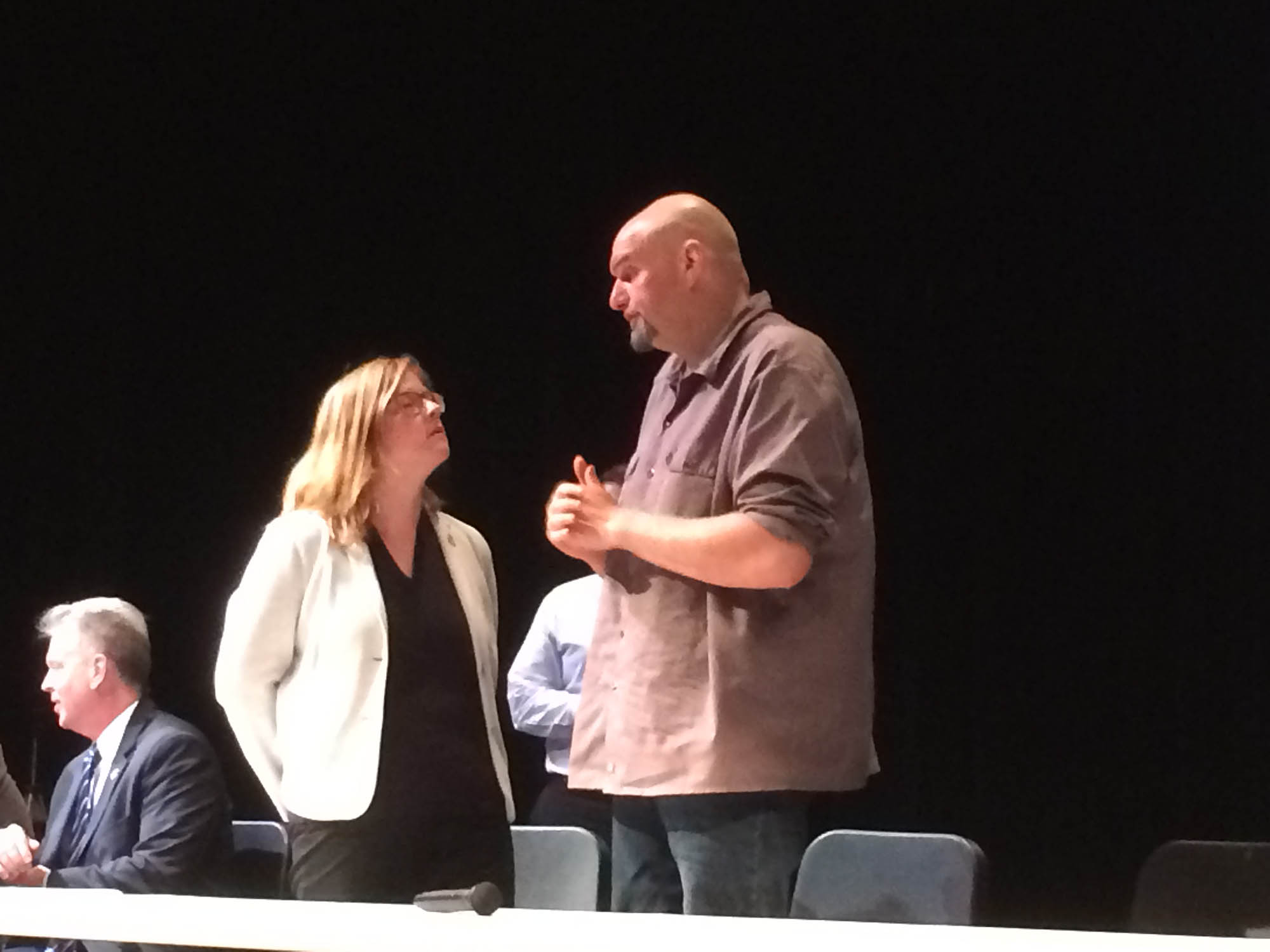No Smoke, but Some Fire: Pols Hear Local Views on Legalizing Recreational Marijuana
Pennsylvania Lieutenant Governor John Fetterman and State Representative Leanne Krueger were two of seven elected officials hearing comments Monday evening on the prospective legalization of recreational marijuana sale and use. Photo by Philip Host.
Lieutenant Governor John Fetterman came to Strath Haven High School on Monday evening, April 22, to hear what Delaware County residents had to say about the legalization of recreational marijuana. Delaware County was the 44th stop on his 67 county “listening tour,” and throughout the forum Lt. Gov. Fetterman stayed largely silent, speaking up only to thank each participant and remind some of the more verbose participants that others were waiting their turn.
Fetterman was joined by five Pennsylvania state Representatives from Delco — namely Chris Quinn (R) of the 168th district, Leanne Krueger (D) of the 161st, Jennifer O’Mara (D) of the 165th, Mike Zabel (D) of the 163rd, and Dave Delloso (D) of the 162nd — as well as U.S. Congresswoman Mary Gay Scanlon. Reps Quinn, Rep. Krueger, Rep. O’Mara, and Rep. Delloso all expressed cautious support for legalizing recreational marijuana, while Rep. Zabel kept his stance to himself. Rep. Scanlon said that she was in favor of federal decriminalization and would support legislation that made it possible for banks to work with the legal marijuana industry, which is now prohibited under federal law.
Support for recreational marijuana legalization ran high among the audience of more than 100, with an informal hands-raised poll showing only eight people opposed, and an additional six undecided. Several supporters cited revenues from a marijuana tax as a potential benefit, and several invoked principles of personal freedom. A woman from Lansdowne who identified herself as Fatima noted the disproportionate toll that marijuana arrests have had on African American communities, and was among a handful of supporters who expressed concern that the economic benefits of a marijuana industry would pass over those most afflicted by the war on drugs. Several recommended that people convicted of distribution of marijuana should not be disqualified from owning a dispensary, whether medical or recreational.
Opponents had concerns over marijuana acting as a “gateway drug” to opiates; supporters posited that it was the dealers, not the drug itself, that urged users on to harder substances. Cathy Spahr, a resident of Upper Chichester who identified herself as a recovering alcoholic and addict, offered a slightly different take: “Any drug would have been a gateway for me,” she said. “Alcohol, LSD, you name it.” She added that she had been to prison twice and that although she was 24 years clean, it had taken her a decade to get her record expunged and that during that time she had been forced to work minimum wage jobs.
The forum was intended to cover legalization of recreational marijuana on the state level — rather than discussion of the state medical marijuana program and federal decriminalization — Rep. Scanlon’s presence, as well as the complex interplay between the recreational and medicinal markets and contradictions among state and federal law made those topics all but unavoidable.
A large proportion of those who spoke in favor of recreational marijuana said that they were medical marijuana cardholders. Recurring themes included hope that recreational legalization would reduce stigma against its medical use and concern over the high cost for patients under the current medical program. Anesthesiologist Jeff Mandel said that he would like to see more research before deciding whether marijuana should be legalized recreationally, but noted that research was nearly impossible as long as it was classified as a Schedule 1 drug, a classification which rests on the highly disputed claim that marijuana holds no medical benefits. Other schedule 1 drugs include heroin, peyote, and ecstasy, which are generally treated as “worse” than schedule 2 drugs including cocaine, oxycodone, and fentanyl. “Scheduling” is bound to influence state policy regarding marijuana, though the power to initiate changes to drug scheduling rests with the U.S. Attorney General.
Attendees’ strong preference for marijuana legalization might not be representative of Delaware County as a whole, especially given that the venue is situated in a traditionally “blue” area of Delco. However, though people spoke passionately on both sides — from the woman who said that marijuana had saved her life, to the man who feared that it would lead to “a flophouse in Kensington and suicide” — both the audience and the panel indicated that in this corner of Pennsylvania, there was more political energy for legalization than against.



